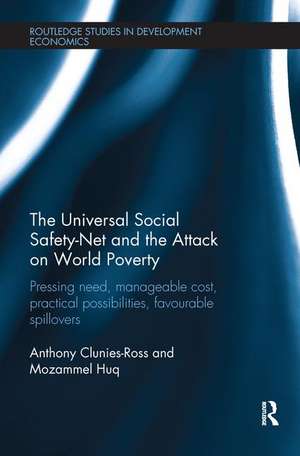The Universal Social Safety-Net and the Attack on World Poverty: Pressing Need, Manageable Cost, Practical Possibilities, Favourable Spillovers: Routledge Studies in Development Economics
Autor Anthony Clunies-Ross, Mozammel Huqen Limba Engleză Paperback – 9 dec 2016
Din seria Routledge Studies in Development Economics
-
 Preț: 309.74 lei
Preț: 309.74 lei -
 Preț: 327.17 lei
Preț: 327.17 lei -
 Preț: 326.49 lei
Preț: 326.49 lei -
 Preț: 311.41 lei
Preț: 311.41 lei -
 Preț: 394.38 lei
Preț: 394.38 lei - 8%
 Preț: 396.85 lei
Preț: 396.85 lei -
 Preț: 260.83 lei
Preț: 260.83 lei - 18%
 Preț: 1165.24 lei
Preț: 1165.24 lei - 15%
 Preț: 470.31 lei
Preț: 470.31 lei - 18%
 Preț: 1057.05 lei
Preț: 1057.05 lei - 18%
 Preț: 1225.29 lei
Preț: 1225.29 lei - 18%
 Preț: 1113.63 lei
Preț: 1113.63 lei - 18%
 Preț: 1300.62 lei
Preț: 1300.62 lei - 26%
 Preț: 878.42 lei
Preț: 878.42 lei - 18%
 Preț: 1166.05 lei
Preț: 1166.05 lei - 18%
 Preț: 1059.45 lei
Preț: 1059.45 lei -
 Preț: 381.11 lei
Preț: 381.11 lei - 25%
 Preț: 823.63 lei
Preț: 823.63 lei - 25%
 Preț: 361.84 lei
Preț: 361.84 lei - 16%
 Preț: 274.01 lei
Preț: 274.01 lei - 18%
 Preț: 1060.87 lei
Preț: 1060.87 lei - 18%
 Preț: 1168.85 lei
Preț: 1168.85 lei - 18%
 Preț: 1171.89 lei
Preț: 1171.89 lei - 18%
 Preț: 1068.18 lei
Preț: 1068.18 lei - 18%
 Preț: 1060.19 lei
Preț: 1060.19 lei - 18%
 Preț: 1341.98 lei
Preț: 1341.98 lei - 18%
 Preț: 1169.16 lei
Preț: 1169.16 lei - 18%
 Preț: 1057.05 lei
Preț: 1057.05 lei - 15%
 Preț: 708.81 lei
Preț: 708.81 lei - 18%
 Preț: 1287.06 lei
Preț: 1287.06 lei - 18%
 Preț: 1124.73 lei
Preț: 1124.73 lei - 18%
 Preț: 1157.34 lei
Preț: 1157.34 lei - 27%
 Preț: 832.80 lei
Preț: 832.80 lei - 28%
 Preț: 850.91 lei
Preț: 850.91 lei - 18%
 Preț: 1066.79 lei
Preț: 1066.79 lei - 25%
 Preț: 658.19 lei
Preț: 658.19 lei - 25%
 Preț: 992.63 lei
Preț: 992.63 lei - 18%
 Preț: 1069.23 lei
Preț: 1069.23 lei - 15%
 Preț: 703.08 lei
Preț: 703.08 lei -
 Preț: 395.63 lei
Preț: 395.63 lei - 18%
 Preț: 706.91 lei
Preț: 706.91 lei -
 Preț: 419.92 lei
Preț: 419.92 lei - 18%
 Preț: 1055.38 lei
Preț: 1055.38 lei - 27%
 Preț: 993.85 lei
Preț: 993.85 lei - 18%
 Preț: 707.10 lei
Preț: 707.10 lei -
 Preț: 409.19 lei
Preț: 409.19 lei
Preț: 338.33 lei
Preț vechi: 386.78 lei
-13% Nou
Puncte Express: 507
Preț estimativ în valută:
64.75€ • 67.35$ • 53.45£
64.75€ • 67.35$ • 53.45£
Carte tipărită la comandă
Livrare economică 14-28 aprilie
Preluare comenzi: 021 569.72.76
Specificații
ISBN-13: 9781138243996
ISBN-10: 113824399X
Pagini: 224
Ilustrații: 6
Dimensiuni: 156 x 234 mm
Greutate: 0.45 kg
Ediția:1
Editura: Taylor & Francis
Colecția Routledge
Seria Routledge Studies in Development Economics
Locul publicării:Oxford, United Kingdom
ISBN-10: 113824399X
Pagini: 224
Ilustrații: 6
Dimensiuni: 156 x 234 mm
Greutate: 0.45 kg
Ediția:1
Editura: Taylor & Francis
Colecția Routledge
Seria Routledge Studies in Development Economics
Locul publicării:Oxford, United Kingdom
Public țintă
Postgraduate and UndergraduateCuprins
Part I: Case for a Safety Net 1. Paradox Need and Opportunity 2. Three Sages and Two New Messages 3. The Basic Case 4. Size of the Extreme Poverty Gap Part II: Ways and Means 5. Targeting the Poor and Fixing Rates 6. Difficulties and Obstacles 7. Financing Social Safety Nets 8. Conditional Cash Transfers (CCTs) 9. Employment Guaranteses 10. Paying for Health Care 11. The @other' Millenium Development Goals: Compeetition or Synergy? 12. Politics of Safety Nets: Turning Aspiration into Reality Part III: Another Window 13. The NGOs and Microcredit in Bangladesh Part IV: Summary 14. Imperative and Hope
Notă biografică
Anthony Clunies-Ross is Emeritus Professor at University of Strathclyde in Glasgow. His publications include Taxation of Mineral Rents (jointly with Ross Garnaut, Clarendon Press, 1983), and he is co-author (with David Forsyth and Mozammel Huq) of Development Economics (McGraw-Hill, 2009).
Mozammel Huq teaches at the University of Strathclyde in Glasgow and is also Visiting Professor of Economics at Uttar Bangla College (National University, Bangladesh). He is the author of a number of books including The Economy of Ghana: The First 25 Years since Independence (Macmillan, 1989), and is co-author (with David Forsyth and Anthony Clunies-Ross) of Development Economics (McGraw-Hill, 2009).
Mozammel Huq teaches at the University of Strathclyde in Glasgow and is also Visiting Professor of Economics at Uttar Bangla College (National University, Bangladesh). He is the author of a number of books including The Economy of Ghana: The First 25 Years since Independence (Macmillan, 1989), and is co-author (with David Forsyth and Anthony Clunies-Ross) of Development Economics (McGraw-Hill, 2009).
Descriere
The book is concerned with strategy and tactics for directing that small slice of world income into filling the gap. This must be done country by country, on the initiative of each country’s government: with the maximum involvement of its own civil society, and with the rich world also making a contribution. To add momentum, the international community needs to adopt targets far more specific than the fifty percent extreme ‘poverty reduction’ of the first Millennium Development Goal.
